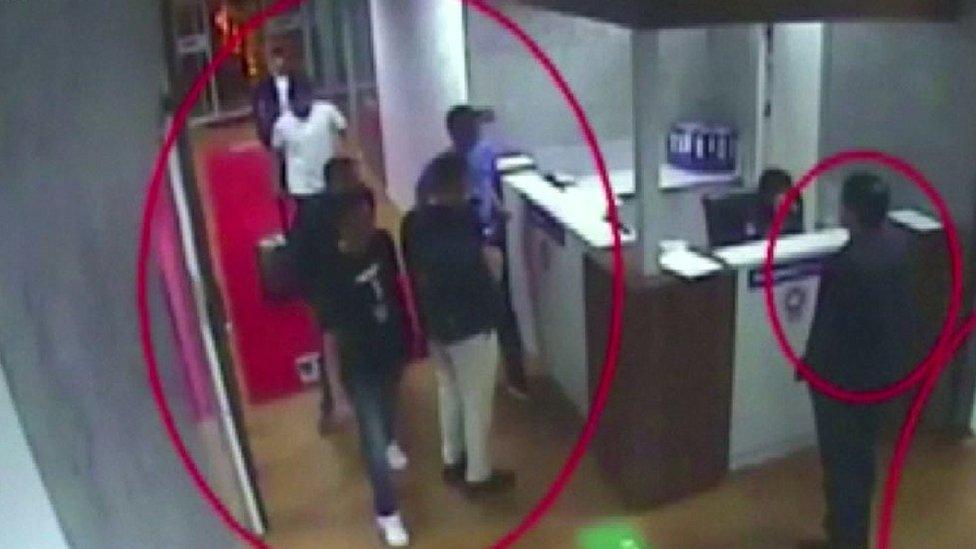Jamal Khashoggi disappearance: UN chief demands 'truth'
- Published
CCTV footage shows missing Saudi journalist Jamal Khashoggi entering the Saudi consulate in Istanbul.
The head of the United Nations has demanded "the truth" over the disappearance of the Saudi journalist Jamal Khashoggi.
Secretary General Antonio Guterres told the BBC he feared such disappearances would happen more regularly and become a "new normal".
Mr Khashoggi, a critic of the Saudi government, vanished on 2 October after visiting its consulate in Istanbul.
Saudi Arabia says accusations it ordered his killing there are "lies".
Interior Minister Prince Abdulaziz bin Saud bin Naif bin Abdulaziz, in quotes reported by the official Saudi Press Agency in Friday, said the kingdom was also keen to uncover "the whole truth", but added that allegations it had issued orders to kill Mr Khashoggi were "baseless".
A Turkish security source has told the BBC that officials had audio and video evidence proving Mr Khashoggi, who writes for the Washington Post, was murdered inside the consulate.
US President Donald Trump, who has sought to build good relations with Saudi Arabia, pledged to uncover the truth.
But he ruled out halting big US military contracts with the kingdom on the grounds that jobs would be lost.
Mr Trump on Friday told reporters he would call King Salman of Saudi Arabia to discuss "the terrible situation in Turkey".
What did Mr Guterres say?
He told me at the International Monetary Fund meeting in Bali: "We need to have a strong request for the truth to be clear.
"We need to know exactly what has happened and we need to know exactly who is responsible and, of course, when we see the multiplication of this kind of situation I think we need to find ways in which accountability is also demanded."
Secretary General Antonio Guterres told the BBC's Kamal Ahmed "we need to know exactly what has happened"
He said he believed the legal system should be able to guarantee accountability, but added: "I must say I am feeling worried [at] this apparent new normal.
"Because this kind of incident is multiplying and it's absolutely essential to make sure that the international community says clearly that this is not something that can happen."
Saudi Arabia is hosting a key investment conference in Riyadh this month.
Mr Guterres said that once there was a "clear answer" about what had happened, governments should respond "in the appropriate way" about whether to attend.
So what will happen with the conference?
US Treasury Secretary Steven Mnuchin said Washington was "looking for information" and wanted to understand the "realities" of what had happened.
"We express concerns for Mr Khashoggi and his family," Mr Mnuchin said.
Jamal Khashoggi: What we know about the journalist's disappearance and death
But he said he was still planning to attend the Future Investment Initiative conference in Riyadh, dubbed "Davos in the Desert", starting on 23 October.
Jim Kim, the head of the World Bank, has already withdrawn from the event, while Sir Richard Branson, the head of Virgin, has said he is suspending his role as director of two tourism projects.
He has also halted discussions about a $1bn (£750m) investment by the Saudi sovereign wealth fund into Virgin's space ventures.
On Saturday, International Monetary Fund chief Christine Lagarde said she was "horrified" by reports coming out of Turkey but would still attend the Saudi conference.
"I have to conduct the business of the IMF in all corners in the world. At this point of time my intention is to not change my plans and to be very attentive to the information that is coming out in the next few days," she said.
What do Turkey's recordings reveal?
The latest reports suggest an assault and a struggle took place in the consulate.
A Turkish security source has confirmed to BBC Arabic the existence of an audio and a video recording. What is not clear is if anyone other than Turkish officials has seen or heard them.
One source is cited by the Washington Post as saying men can be heard beating Mr Khashoggi; it adds that the recordings show he was killed and dismembered.
"You can hear his voice and the voices of the men speaking Arabic," a separate source told the Post, which employed Mr Khashoggi as a contributing columnist. "You can hear how he was interrogated, tortured and then murdered."
Turkish media reports say officials are investigating sound recordings made by Mr Khashoggi's smart-watch. The BBC has been unable to independently verify this claim.
Turkish TV has already broadcast CCTV footage of the moment Mr Khashoggi walked into the consulate for an appointment at which he was due to receive papers for his forthcoming marriage to Turkish fiancée Hatice Cengiz.
Separately, a video has emerged of men described as Saudi intelligence officers entering and leaving Turkey.
Turkish media say sources have identified a 15-strong team involved in Mr Khashoggi's disappearance. The BBC has been told that one was Maher Mutreb, an intelligence colonel based in London, and another was thought to be a forensics specialist.
What happens now with the investigation?
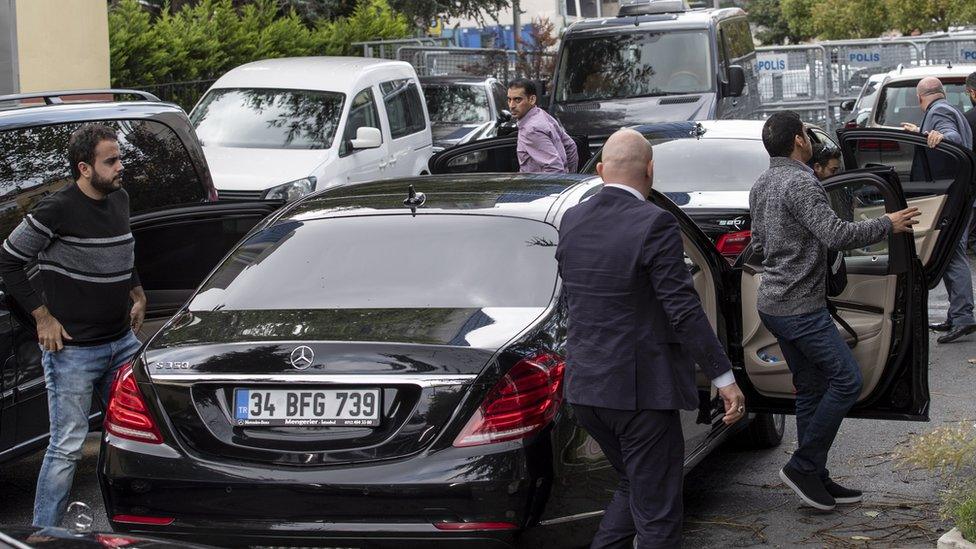
A Saudi delegation arrived in Turkey on Friday ahead of talks expected to take place at the weekend
However, the government has agreed to a joint investigation with the Saudis, and a Saudi delegation arrived in Turkey on Friday to take part in talks expected over the weekend.
Their arrival came a day after a senior Saudi royal figure, Prince Khaled al-Faisal, was said to have briefly visited Turkey amid signs that the Saudi monarchy was seeking an urgent solution to the diplomatic crisis.
- Published9 October 2018
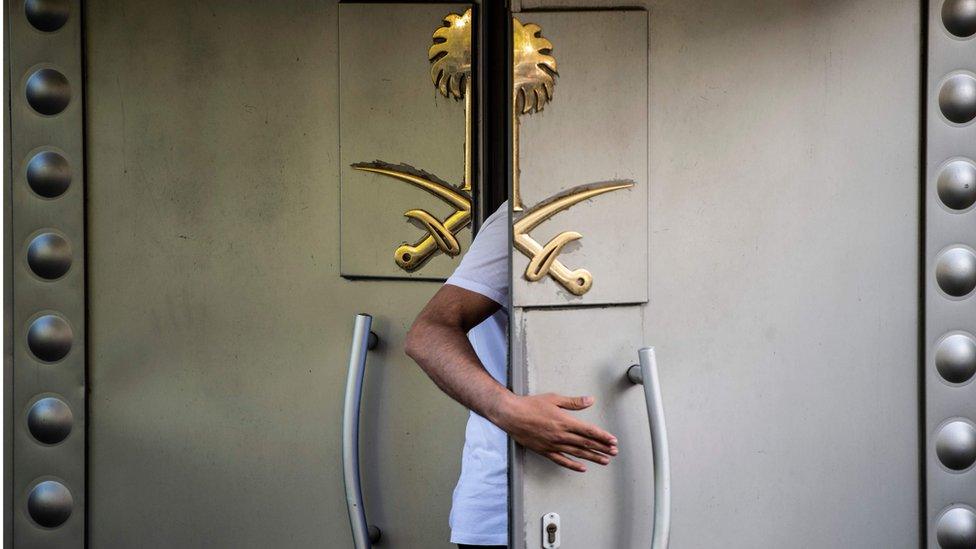
- Published11 October 2018
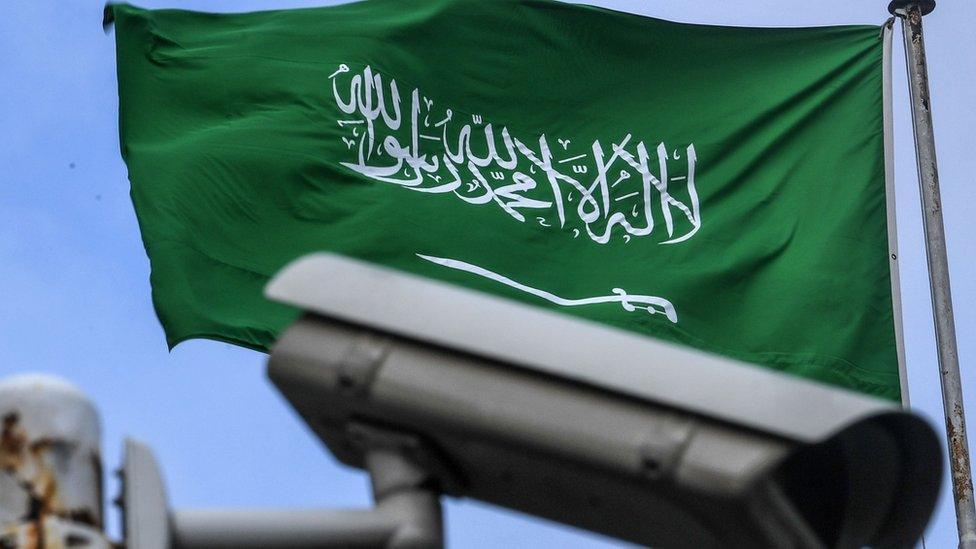
- Published12 October 2018
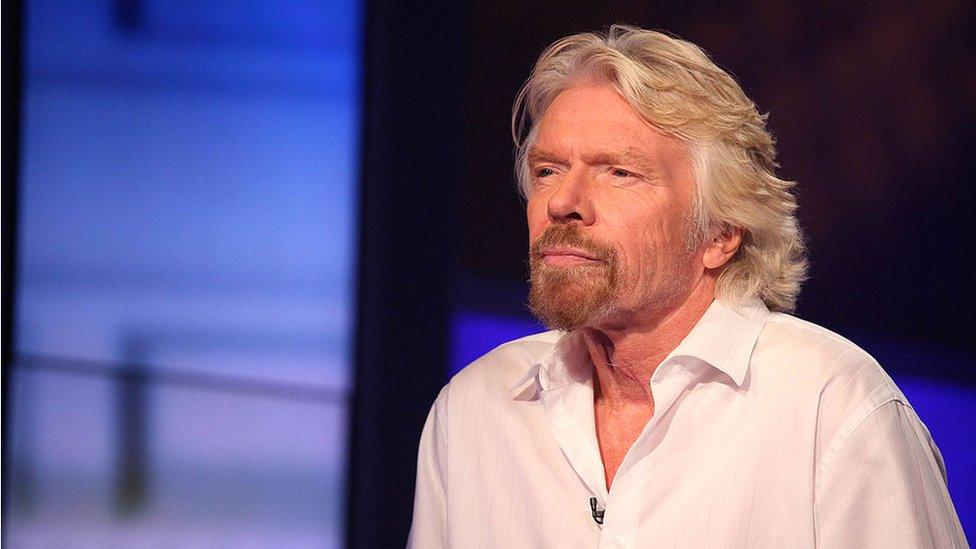
- Published10 October 2018
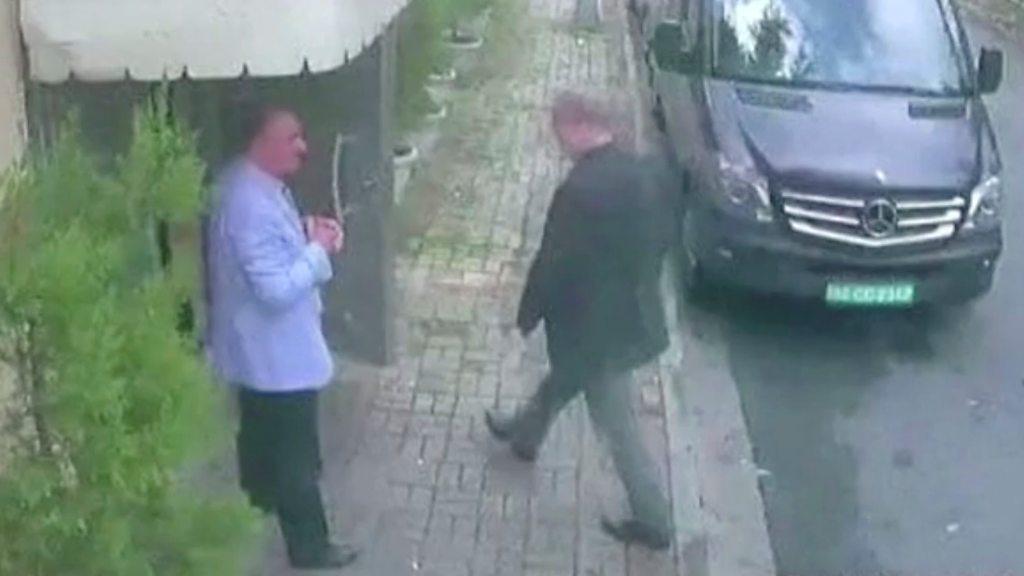
- Published10 October 2018
